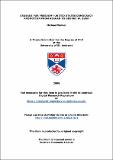Files in this item
Crusade for freedom? United States democracy promotion from Reagan to George W. Bush
Item metadata
| dc.contributor.advisor | Lang, Anthony F. | |
| dc.contributor.author | Walker, Michael | |
| dc.coverage.spatial | 223 | en |
| dc.date.accessioned | 2008-11-10T15:13:30Z | |
| dc.date.available | 2008-11-10T15:13:30Z | |
| dc.date.issued | 2008-11 | |
| dc.identifier.uri | https://hdl.handle.net/10023/551 | |
| dc.description.abstract | Presidents of the United States and other American policymakers have throughout history cited democracy promotion as one of the chief goals of American foreign policy, and the current administration of George W. Bush has been no exception. However, and notwithstanding the habitual endorsement of this objective by US administrations, the subject of democracy promotion has received relatively little academic attention. This study aims to correct this gap in the literature by considering two questions relating to United States democracy promotion. First, have the efforts of the US to spread democracy to other countries met with success? Second, is promoting democracy truly a priority of American policymakers, or is it rather window dressing cynically aimed at winning public and congressional support for foreign policy? I begin by defining the terms democracy and democracy promotion. I then use three recent case studies to answer the two questions outlined above, the first of which focuses on President Reagan’s policy towards Nicaragua. In the second case study I consider President Clinton’s policy towards Haiti, while the third deals with President George W. Bush’s policy towards Colombia. The evidence I present points to the conclusion that the United States has not been successful in its efforts to promote democracy in other countries, and that spreading democracy abroad is at best a secondary goal of American foreign policy. The evidence presented in the thesis also demonstrates the utility of foreign policy analysis-based approaches to the study of international relations. | en |
| dc.format.extent | 1131173 bytes | |
| dc.format.mimetype | application/msword | |
| dc.language.iso | en | en |
| dc.publisher | University of St Andrews | |
| dc.rights | Creative Commons Attribution-NonCommercial-NoDerivs 3.0 Unported | |
| dc.rights.uri | http://creativecommons.org/licenses/by-nc-nd/3.0/ | |
| dc.subject | Democracy promotion | en |
| dc.subject | United States foreign policy | en |
| dc.subject | George W. Bush | en |
| dc.subject | Bill Clinton | en |
| dc.subject | Ronald Reagan | en |
| dc.subject | Haiti | en |
| dc.subject | Colombia | en |
| dc.subject | Nicaragua | en |
| dc.subject.lcc | E840.W2 | |
| dc.subject.lcsh | United States--Foreign relations--1981- | en |
| dc.subject.lcsh | Democratization | en |
| dc.subject.lcsh | Reagan, Ronald | en |
| dc.subject.lcsh | Clinton, Bill, 1946- | en |
| dc.subject.lcsh | Bush, George W. (George Walker), 1946- | en |
| dc.subject.lcsh | United States--Foreign relations--Nicaragua | en |
| dc.subject.lcsh | United States--Foreign relations--Haiti | en |
| dc.subject.lcsh | United States--Foreign relations--Colombia | en |
| dc.title | Crusade for freedom? United States democracy promotion from Reagan to George W. Bush | en |
| dc.type | Thesis | en |
| dc.type.qualificationlevel | Doctoral | en |
| dc.type.qualificationname | PhD Doctor of Philosophy | en |
| dc.publisher.institution | The University of St Andrews | en |
This item appears in the following Collection(s)
Except where otherwise noted within the work, this item's licence for re-use is described as Creative Commons Attribution-NonCommercial-NoDerivs 3.0 Unported
Items in the St Andrews Research Repository are protected by copyright, with all rights reserved, unless otherwise indicated.


